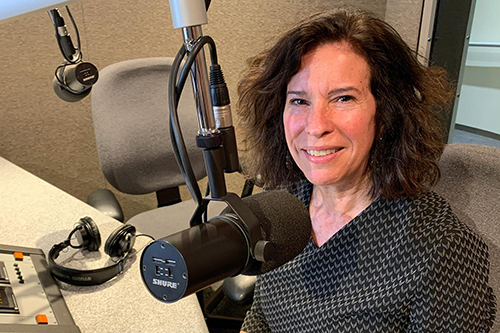KJZZ 91.5: Polls show Arizonans agree on most big issues. The politicians who represent them don't


(Tim Agne/KJZZ)
Sybil Francis in KJZZ's studio in February 2020.
Arizona is likely to be at the center of the 2024 election. We are a swing state on the border, rife with independent voters, and Sybil Francis argues that means we have the chance to steer what could be a real spectacle of an election year toward substance.
Francis heads up the nonpartisan Center for the Future of Arizona, which for 15 years has been working with Gallup to find out what Arizonans think about various issues. And their findings are consistent: Arizonans generally agree on most of the big issues in the state — but that doesn’t usually translate to what politicians do in office here.
The Show spoke with her more about where those points of agreement lie and why politicians usually ignore them.
SYBIL FRANCIS: So when we say Arizonans agree, we have a very strict definition of that. We have to have 70% agreement or more among this vast array of Arizonans. Our surveys are very, very representative. We made sure to ask people in rural Arizona, in urban areas, of all political persuasions, education levels, income levels, race and ethnicity, religion. So when we say Arizonans agree, we really mean it because we have the data to back it up.
LAUREN GILGER: Give me some of the examples here. Let’s start with education. Such a big issue to so many Arizonans. Where do most Arizonans agree when it comes to education?
FRANCIS: Well, in the big picture, Arizonans really understand that education is very important to the future of our state. So we have huge agreement on the importance of not only high school graduation, but also moving on to post-secondary education, whether that’s career and technical education, community college or four year university. Arizonans understand that not only is education important to the future of any individual and their success and well-being, but to the future and well-being of the state.
GILGER: When it comes to policies that underlie that, how do we get there? Do Arizonans also agree on those kind of intricacies? Because many politicians don’t, right?
FRANCIS: Right. So as well, we also ask Arizona, what actions do they want to see? Certainly, Arizonans very much want to see more quality teachers and principals in schools. There’s a huge concern about the lack of qualified teachers, especially in rural Arizona. Yes, Arizonans want to see more funding for education. This is something that has been true for many, many years. And I think Arizonans have shown this through a number of ballot initiatives, increasing funding for education.
GILGER: So when it comes to probably the biggest education issue that’s going to be at least on the lips of many lawmakers this session — the voucher program, the empowerment scholarship accounts, the massive expansion we’ve seen of that — have you done polling there?
FRANCIS: We have not done surveys on this. One thing is that we sometimes, you know, want to focus on areas that we don’t already have data on. We know that Arizona has rejected through a ballot initiative expansion of ESAs some years ago. However, having said that, we are going to be doing a survey again in this election cycle and will likely touch on that issue since it is so important.
GILGER: Yeah, more to come there. OK. Let’s talk about immigration, because that is quickly becoming maybe the biggest issue, at least on a national scale and probably in many local races in Arizona as well because of what’s happening at the border right now. What do Arizonans generally agree upon when it comes to immigration? Because if you listen to the political rhetoric, it doesn’t seem like much.
FRANCIS: Well, what’s so fascinating to me is the numbers here are just overwhelming. Now, I do want to recognize that immigration is very much driven by federal rules and regulations and laws. But we did ask about immigration. And so over 80% of Arizonans support comprehensive immigration reform with a pathway to citizenship for Dreamers. And when you think about that, it’s kind of interesting that with such a huge agreement that for probably decades there’s been so little movement on this issue. And that kind of begs the question about why. But there’s very strong support for immigration reform.
Arizonans, we also asked in what we called our Arizona Voters Agenda, we did for the first time, did a survey of just likely Arizona voters in the 2022 election. We’re going to do that again in ’24. We did ask about some of the so-called hot button issues like building the wall. That did not make it onto our Arizona Voters Agenda. And to get onto that agenda, there had to be 50% or more support across the board amongst Democrats, Republicans and independents. Arizonans understand that Mexico is a very, very important trading partner with ours, and they really understand that immigration reform is important for a strong commerce between Arizona and Mexico.
GILGER: Yeah. So it sounds like what you’re saying is the rhetoric around most politics is just that, like it’s just rhetoric. So how do you think — and you’ve been doing this for a long time — how do you think we get around that?Is it too idealistic to think that politicians and voters will reject each kind of hot button or headline grabbing kinds of moments and focus on real issues?
FRANCIS: So we do hear this pushback on our data that it’s too idealistic … is it really representative of Arizonans? And I like to say that, why are we so cynical? Why should we not believe that Arizonans really do agree on these big issues? Now, we’re not naive enough to think that everyone necessarily agrees on how you resolve them all. But I think it’s very important to remind ourselves, because people get very discouraged when they hear about polarization and division. It can be very, very discouraging if that’s the story we tell about ourselves. So one of the things that I see as our mission is how do we tell a different story about who we are as Arizonans? Because I think when you do that, you can create some hope and opportunity for coming together to work through those details.
So I think it is important to keep the things that we have in common in mind. I also think that from a practical standpoint, Arizonans very much believe in the integrity and security and safety of our election system. But interestingly enough, they don’t necessarily think that elected leaders are representing their views. So that kind of made us go back and look at the data and say, “Well, this is interesting. Why do we have such gaps between what Arizonans say they want and how that’s getting translated into our politics?” And it kind of forced us to look at, is the way even our elections are designed, is it designed to be as representative as it could be?
GILGER: So is this leading to what you’ve written about also, which is that there is an initiative that could be on the ballot in November that would basically change the way we vote in primary elections, put in a form of ranked choice voting. And the idea is to sort of eliminate the extremism in primary elections.
FRANCIS: So we are a nonpartisan organization. We don’t endorse initiatives or politicians. But what I have said is that we definitely need to take a hard look at how our election system is designed right now. We know that in Arizona, we have equal numbers of Democrats, Republicans and independents, roughly speaking. And that our elections are designed around partisan primaries, and partisan primaries and mean that it’s much more difficult for, say, an independent to vote in a Republican or a Democratic primary. So the results get somewhat skewed in terms of representation of Arizonans because they favor, you know, they’re partisan, so they favor one party or the other.
So if you wanted to think about a new kind of design, why not think about a primary in which everyone can vote? Everyone can run, and everyone can vote, and then the top vote getters move on to the general election. You know, I did point out in my op-ed piece that I think this ballot initiative, Make Elections Fair (Arizona), is certainly worth a look because they are trying to get at this problem.
But as I said, there may be different ways to get to this issue, but I think it’s a very, very significant issue. And I think really is going to be the key to getting more representation out of our elections.
GILGER: I’m sure you meet with lawmakers often, that you talk to them about exactly these kinds of points often, give them the data. How do they generally react to this?
FRANCIS: Well, I get asked this question a lot because people get really, really agitated when I tell them about the results of our surveys. And they say elected leaders, candidates for office really need to understand this information. And so yes, I have briefed candidates running for governor in the last election. I’ve briefed candidates running for Congress, for the Senate, legislators in Arizona — and they are very interested. But I will say it’s been a little bit of a peculiar experience because my sense is that they think it’s kind of interesting, but their eyes glaze over a little bit because I get the sense that it’s not necessarily of direct relevance to them.
And I think this goes back potentially to how do they get elected? Do they get elected to represent the majority of Arizonans, or are they being elected through a system that is more partisan and really tends to be more representative of people who vote in primaries who are much more partisan?
GILGER: Yeah. Yeah. All right. We’ll leave it there for now. Sybil Francis, president, CEO and chair at the nonpartisan Center for the Future of Arizona. Sybil, thank you for coming in. I appreciate it very much.
FRANCIS: My pleasure.
